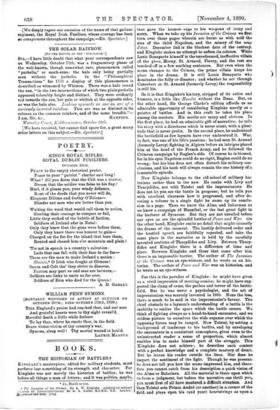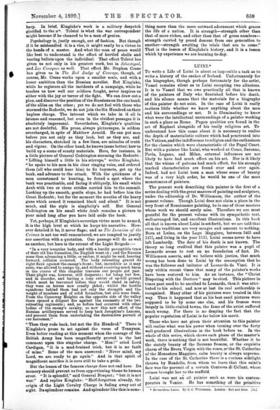BOOKS.
THE HISTORIAN OF BATTLES.f KINGLAKE'S masterpiece, edited for military students, must perforce lose something of its strength and character. For Kinglake was not merely the historian of battles; he was before all things a man of letters ; and it was politics, maybe,
• Le., Health to you.
t The Invasion of the Crimea. By A. W. Kinglake. Adapted for military ,.;;i•iente by Lieutenant-Colonel Sir G. S. Clarke, K.C.M.G., R.E. Loudon : If ,o.kwood and Sons. 115s.1 that gave the keenest edge to his weapons of irony and scorn. When we take up his Invasion of the Crimea we first turn over those pages wherein are burnt as with acid the sins of the third Napoleon, and the misery of the coup d'etat. December 2nd is the blackest date of the century, and Kinglake makes no attempt to soften its colours. While Louis Bonaparte himself is the unredeemed, ineffective villain of the piece, Morny, St. Arnaud, Fleury, and the rest are touched off in a few scathing sentences. But even when the
scene changes to the Crimea, the prime villain keeps his place in the drama. It is still Louis Bonaparte who dominates the folly or disaster ; and whether he act through Canrobert or St. Arnaud (formerly Leroy) the responsibility is still his.
So it is that Kinglake's his tory, stripped of its satire and humour, is a little like Hamlet without the Dane. But, on the other hand, Sir George Clarke's edition affords us an admirable opportunity of considering Kinglake merely as a painter of battles. And in this craft he takes his place among the masters. His merits are many and obvious. In the first place, he had an admirable gift of narrative; he tells his story with a directness which is never scant, with a pleni- tude that is never prolix. In the second place, he understood the battlefield as few laymen have ever understood it. War, in fact, was one of his life's passions: he had seen St. Arnaud (formerly Leroy) fighting in Algiers before an intrigue placed him at the head of the French Army, and be followed the Crimean campaign by Raglan's side. Of course he is biassed, for in his eyes Napoleon could do no right, Raglan could do no wrong; but his bias does not often disturb his military con- clusions, and his book will always remain the one history of a lamentable episode.
Now Kinglake belongs to the old school of military his- torians rather than to the new. He ranks with Livy and Thucydides, not with Tolstoi and the impressionists. He does not let you see the battle in progress; but he tells you with excellent clearness how it progressed, and after de- voting a volume to a single fight he sums up its conclu- sion in a page. Thus we know the Alma and Inkerman as we know a campaign of Hannibal, or the last great fight in the harbour of Syracuse. But they are not unrolled before our eyes as are the splendid battles of Peace and War. On the other hand, Kinglake omits no detail that might intensify the drama of the moment. The hastily delivered order and the hustled speech are faithfully repeated, and take the same place in the narrative as is held by the carefully invented orations of Thucydides and Livy. Between Thucy- dides and Kinglake there is a difference of time and place. Between Kinglake and those that come after him there is an impassable barrier. The author of The Invasion of the Crimea was an eye-witness, and he wrote as an his- torian. The author of Peace and War was an historian, and he wrote as an eye-witness.
For this is the paradox of Kinglake : he might have given us a vivid impression of meeting armies; he might have sug- gested the clang of arms, the pathos and terror of the battle- field. But he was never a psychologist, and the art of impressionism was scarcely invented in 1860. None the less, there is much to be said in the impressionist's favour. The chief obstacle to a layman's understanding of a battle is the inability to realise the space which the battle covers. We think of fighting always as a hand-to-hand encounter, and we seldom picture to ourselves the wide expanse over which the opposing forces may be ranged. Now Tolstoi, by setting a background of landscape to his battles, and by enveloping the encounters in a consistent atmosphere, gives even to the uninstructed reader a sense of proportion, which almost enables him to make himself part of the straggle. This Kinglake does not achieve ; he describes each contest
with a perfect knowledge and a complete mastery of detail. But he leaves his reader outside the lines. Nor does he impart the sentiment of the fight. Though he was present. be does not tell you how the scene impressed him, and there- fore you cannot catch from his description a quick vision of the Alma or Balaclava. All the material is there upon which to form a judgment, but before the narrative can thrill you, you must first of all have mastered a difficult situation. And then Tolstoi sets Prince Andr4 (or another) in a corner of the field, and plays upon his (and your) heartstrings as upon a
harp. In brief, Kinglake's work is a military despatch glorified to the 70. Tolstoi is what the war correspondent might become if he chanced to be a man of genius.
Psychology is, justly enough, out of fashion. But though if it be mishandled it is a vice, it might easily be a virtue in the hands of a master. And what the man of peace would like best to understand is the effect of hurtled shells and tearing bullets upon the individual. That effect Tolstoi has given us not only in his greatest work, but in Sebastopol, and Les Cosaques as well. That effect Mr. Stephen Crane has given us in The Red Badge of Courage, though, of course, Mr. Crane works upon a smaller scale, and with a lesser ambition than the Russian novelist. But Kinglake, while he registers all the incidents of a campaign, while he teaches us how well our soldiers fought, never inspires us either with the joy or terror of the fight. We can draw out a plan, and discover the position of the Russians on the one hand, of the allies on the other; yet we do not feel with those who stormed the Redoubt, we do not join the Six Hundred on their hapless charge. The interest which we take in it all is intense and reasoned, but even in the vividest passages it is absolutely impersonal. Nevertheless, Kinglake's qualities are not doubtful. His prose, always picturesque, is seldom overcharged, in spite of Matthew Arnold. He can put men before you not only as they look, but as they are, and
his characters, sketched in a few lines, are miracles of truth and vigour. On the other hand, he knows (none better) how to build up a scene of scanty materials. Here, for instance, is a little picture of General Codrington storming the Redoubt : "Lifting himself a little in his stirrups," writes Kinglake, "he spoke to his men in his clear ringing voice, and ordered them (all who could hear him) to fix bayonets, get up the bank, and advance to the attack. With the quickness of a man accustomed to hunting, he found a spot where the bank was practicable, and facing it obliquely, his small white Arab with two or three strides carried him to the summit. Looking up the smooth, gentle slope, he had before him the
Great Redoubt; but for the moment the mouths of the heavy guns which armed it remained black and silent." It is not much, and the style is simplicity's self. But General Codrington on his small white Arab remains a picture to your mind long after you have laid aside the book.
Yet, perhaps, if Kinglake'a sovereign virtue mast be named, it is the high level at which he keeps his narrative. How- ever detailed it be, it never flags; and as The Invasion of the Crimea is not too well remembered, we are tempted to justify our assertion with a quotation. One passage will do as well as another, but here is the retreat of the Light Brigade :-
"In a very irregular body, and with a hardly perceptible trace of their old line formation, the English went on ; and the Russian mass then advancing a little, or rather, it might be said, heaving forward, collision occurred. The body retreating grazed its right flank against the enemy's front ; but, incredible as it may seem, was allowed to scrape by, and without receiving much harm in the course of this singular traverse our people got past. Their plight was, however, still desperate ; for being but few, and in disorder, and having a long extent of up-hill ground which must be traversed before they would stand in safety, they were on horses now cruelly jaded ; whilst the hostile squadrons behind them had not only the strength and the weight of numbers and of solid formation, but also were fresh. From the Causeway Heights on the opposite side of the valley there opened a diligent fire against the remnants of the two retreating regiments ; and, as before had occurred with other bodies of the enemy's cavalry, so now this new effort of the Russian artillerymen served to keep back Jeropkine's Lancers, and prevent them from undertaking the destructive pursuit of our horsemen."
" Then they rode back, but not the Six Hundred." There is Kinglake'a prose to set against the verse of Tennyson. Even better reading at this moment when the courage of the British Army has been magnificently proved is the last comment upon this singular charge. " Men !" cried Lord Cardigan, " it is a mad-brained trick, but it is no fault of mine." Some of the men answered : "Never mind, my Lord, we are ready to go again." And in that spirit of magnificent sacrifice it is ours still to take a pride.
But the lesson of the famous charge does not end here. Its memory should prevent us from apportioning blame to human error. "It is splendid," said General Bosquet ; "bat it is not war." And replies Kinglake : " Half-forgotten already, the origin of the Light Cavalry Charge is fading away out of sight. Its splendour remains. And splendour like this is some- thing more than the mere outward adornment which graces the life of a nation. It is strength—strength other than that of mere riches, and other than that of gross numbers— strength carried by proud descent from one generation to another—strength awaiting the trials that are to come." That is the lesson of Kinglake's history, and it is a lesson which by experience we are learning to-day.























































 Previous page
Previous page